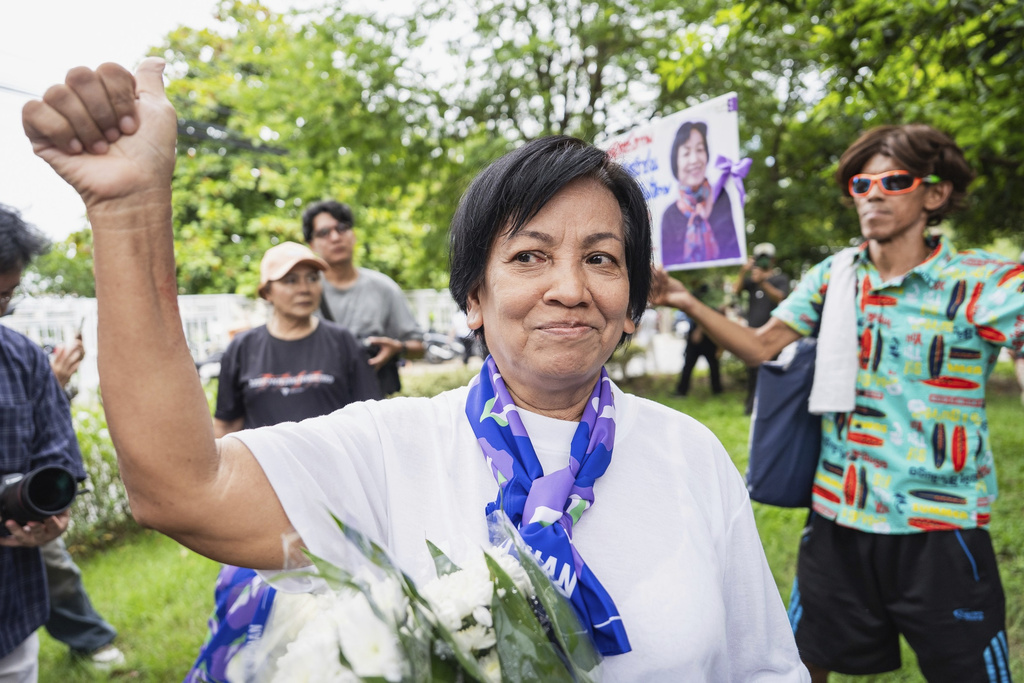A woman in Thailand sentenced to a prison term of more than four decades on a charge of royal defamation was released on Wednesday by a royal pardon after serving just under one-fifth of her term, said a human rights organization.
Thai Lawyers for Human Rights said 69-year-old Anchan Preelert was one of six political prisoners freed under a July 29 pardon on the occasion of King Maha Vajiralongkorn’s birthday.
Anchan, a former civil servant, was sentenced in January 2021 by the Bangkok Criminal Court on 29 counts of violating the country’s lese majeste law for posting audio clips to Facebook and YouTube with comments deemed critical of the monarchy.
She was initially sentenced to 87 years, at that time the longest such sentence ever handed down, but her term was reduced by half to 43 years and six months because she pleaded guilty to the offenses.
Violating Thailand’s law on royal defamation is punishable by three to 15 years’ imprisonment per count. The law is controversial not only because it has been used to punish things as simple as liking a post on Facebook, but also because anyone — not just royals or the authorities — can lodge a complaint. The main criticism is that it is used as a tool to quash political dissent.
Anchan, wearing a white t-shirt and face mask, was embraced by friends and family and received bouquets of flowers from supporters when she walked out of Bangkok’s Central Women’s Correctional Institution, where she spent eight years and four months in total, including pretrial detention, after her arrest in 2015.
“I feel immensely happy. I want to be free for a long time because I’m getting old and my time is running short now,” Anchan told reporters. “For over eight years, it felt like it was all my life, it was bitter because it was not my place to be. It was torturous, it doesn’t matter whether it’s comfortable or not, but it isn’t my home.”
Thai Lawyers for Human Rights has said that more than 270 people have been charged with lese majeste since early 2020, when there was a flurry of protests for reforms to Thailand’s monarchy.
In 2024, an appeals court handed political activist Mongkhon Thirakot in the northern province of Chiang Rai a record 50-year prison term after finding him guilty of violating the lese majeste law.
Public criticism of the monarchy, a linchpin of Thai identity, used to be rare, but student-led pro-democracy protests began to challenge that taboo in 2020, openly criticizing the institution. That led to vigorous prosecutions under what once had been a little-used law.
More than 50 people remain in prison as political prisoners and 32 of them are charged with insulting or defaming the monarchy, said Thai Lawyers for Human Rights.
Last week, Thailand’s former Prime Minister Thaksin Shinawatra was acquitted of a royal defamation charge after the Bangkok Criminal Court found the witnesses and evidence against him were too weak to support a conviction. He was originally charged in 2016 over remarks he made a year earlier to journalists in South Korea
The same court Tuesday acquitted Piyarat Chongthep, a lawmaker from the opposition People’s Party, of royal defamation for posting messages criticizing how protests in 2020 were dispersed and referring to the alleged involvement of the country’s king. It said there was no clear evidence he had personally posted the messages on his Facebook account.
(AP)











